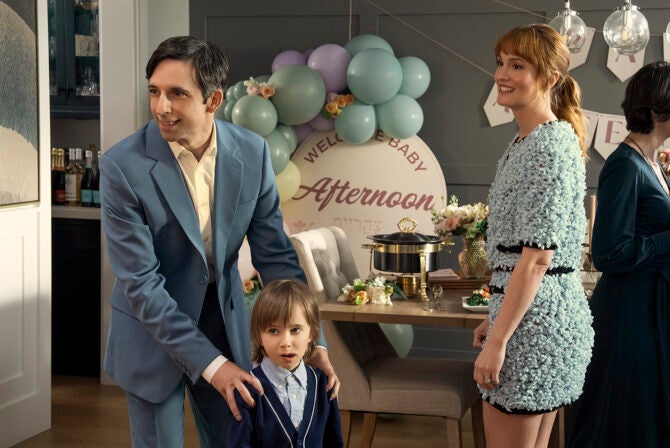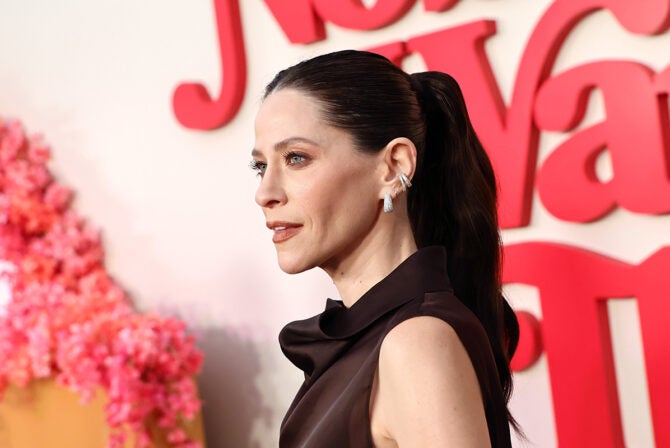
Courtesy of Elaine Hall
As part of our month-long series dedicated to Jewish Disability Awareness Month, Elaine shares her journey of raising a son with severe autism, from toddlerhood through bar mitzvah age to where he’s at now, at almost 20 years old.
Our tradition dictates: “Be fruitful and multiply.” I couldn’t do either. Each year at Rosh Hashanah, where we read Hannah’s story of her inability to give birth, I cried Hannah’s tears. I prayed, “If you give me a child, I will give him back to you, to serve you all his days.” My prayer was finally answered when I adopted my son from an orphanage in Russia.
I had been raised in a religious ”Conservadox” family in a non-Jewish area of Southern Maryland and had felt different all my life. Now, I just wanted normal. I looked forward to returning to LA and beginning a normal life: car pool, little league, Tot Shabbat. On a blissful flight home across many continents, I had no idea what lay ahead of us.
Reality set in quickly. We discovered that our toddler son had liver toxicity, parasites, malnutrition, and he was spiking fevers of 105. He stared at his hands for hours at a time, spun around in circles, opened/closed and banged cabinet doors, made no eye contact, couldn’t speak, tantrumed for hours, and didn’t sleep.
Once we got him physically healthy, and shortly after his circumcision and conversion with the Beit Din and Mikveh, we received the diagnosis: Severe Autism.
Days later I find myself pulling little clothes out of the dryer and folding them. The blue sweater my Mom knitted for him; the Mickey Mouse t-shirt, the tiny Gap jeans he wore the day we brought him home from Russia. I love folding his clothes, making life neat for him. I love the way that folding makes me feel like a normal Mom. But this day, as I fold, I begin to weep and cannot stop. I want to believe that I am above caring about being normal. But I’m not. I care about it for me, and more than that, I care about it for my son. Will my boy have anything normal in his life? Will he have friends? Will he ever play baseball? Will he ever sit next to me in shul like I did with my Dad? Will he graduate high school or go to college or have a bar mitzvah? Will he experience the joy of work? Will he bring home his future bride?
I reach out to my Jewish Community for support and find very little. (This was 18 years ago–now there are many, many programs and support systems.) I seek advice from doctors, therapists, and call insurance companies. I spend hours on the Internet seeking solutions.
We begin intensive therapies, but traditional behavioral therapies don’t work. Doctors look at me with pity; family members look concerned and infer that I should ”send him back to Russia,’’ and my then-husband just stopped looking. I am soon alone with my son, alone with autism. For a second time, I pray my own desperate prayer, “Dear God, please help me find a way to help my son. I will devote my life to your service.”
Again, our prayers are answered. I learn about Dr. Stanley Greenspan (Z.L.) who puts us on a path of relationship-based therapies and coaches me to follow my son’s lead. I dedicate my life to entering my son’s isolated, autistic world. He stares intensely at his hand, I stare at mine and notice the miraculous way that our hands are created to open, close, grasp, and hold. When my son spins in a circle, we hold hands until the two of us are relishing our special haven, with our own unique version of “Ring Around the Rosie.” I learn from Dr. Barry Prizant that all behavior is communication. In time, tantrums cease.
Then hits the divorce, leaving me financially strapped. I pray again–this time for meaningful work. With help, I write and receive a grant from The Jewish Community Foundation to create The Miracle Project, a Jewish Musical Theater program for children of all abilities. I train 20 volunteers in the same methodologies I had devised in my home. We craft an original Jewish musical play starring children with and without disabilities and perform it at a state-of-the-art theater in West Los Angeles. My son plays the role of Nachshon, the leader who took the first step into the Red Sea, which caused the seas to part. I will never forget the sense of joy and gratitude that overwhelmed me upon seeing his angelic, glowing face as he hit his mark and hummed sweetly. In that moment, I was just a Mom like any other, witnessing her child’s first performance.
Seas continue to part for us, and for this we are grateful.

Credit: Scott Tansey
At age 12, the exact year of my son’s Bar Mitzvah, I am asked to create a B’nei Mitzvah program for children with autism at Vista Del Mar in Los Angeles. Our son is the first Bar Mitzvah of Nes Gadol which we celebrate shortly after his 13th birthday. He dances his prayers and recites one word from the Torah–‘Shema.’ We show him how to place his finger on his lips and whisper “Sh” then press his lips together to make the “ma” sound. Just like “Mama,” we say. He does so on this day.
We all cry tears of joy.
Now almost 20 years old, he has exceeded many of the expectations I had long buried. He has two jobs, one at the Shalom Institute in their organic garden, the other at The Farms, our local grocery store. He is learning about organic gardening and wants a career as an organic gardener.

Credit: Epic Photo Journalism
Through The Miracle Project he has become the star of an HBO film, “Autism: The Musical,” and he is a semi-professional model, posing for Kate Winslet’s book, “The Golden Hat”, and as one of the faces of the Los Angeles Jewish Federation’s ‘I Am’ campaign on billboards throughout LA. His story is profiled in “Now I See the Moon,” a book I wrote, which was the official selection for World Autism Awareness Day 2011 at the United Nations.
In April of 2013, this severely autistic, once deemed cognitively impaired young adult ‘spoke’ using his voice activated app SpeakIt on his iPad at The United Nations in front of 400 people where we were both invited to present for World Autism Awareness Day.
At one time, I cried Hannah’s tears, and then prayed for normal. Today I know that normal is just a dial on the washing machine. Our lives are anything but normal–they are extraordinary.
 This post is part of a joint series with Kveller &
This post is part of a joint series with Kveller & Matan during February’s Jewish Disability Awareness Month. Through advocacy, education and training opportunities Matan empowers the Jewish community to include children with special needs. For more information For more information, visit their website.
Matan during February’s Jewish Disability Awareness Month. Through advocacy, education and training opportunities Matan empowers the Jewish community to include children with special needs. For more information For more information, visit their website.
Like this post? Get the best of Kveller delivered straight to your inbox.







